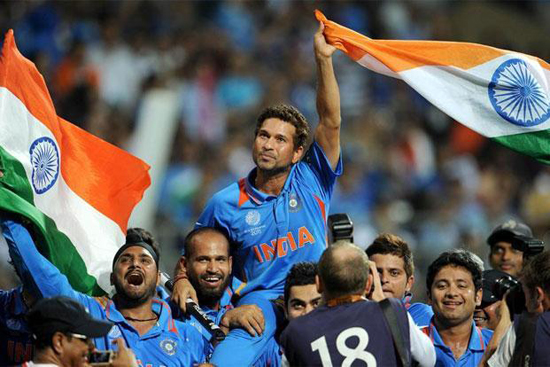
March 27, 1994. That day will always remain seminal in Indian cricket history. It was on that day India found their and world's finest opening batsman in 50-over cricket at Eden Park, Auckland.
Sachin Tendulkar smashed a 48-ball 82 on that day, beginning a long 18-year stint at the pole position after having made his debut five years earlier. Innumerable records have been set during that journey, and some of them will never be broken.
The glitz of those numbers, however, masks two elements that made Tendulkar the most efficient one-day batsman of all time — adaptability and ability to withstand pressure of expectations from a billion fans for whom failure -- of Tendulkar and the team -- was not an option.
From 1994 to 2000 Tendulkar was at his peak of fitness and abilities, and there were no bowlers in the world who didn't face the wrath of his willow; it was classy and eye-catching at the same time.
He scored 8220 runs from 198 matches at 45.66 with 27 hundreds in that seven years, and it was that period that really converted Tendulkar into a household name and a brand worth millions.
Tendulkar had contemporaries like Matthew Hayden, Adam Gilchrist, Sanath Jayasuriya and Saeed Anwar who opened the innings, but none of them controlled a team's fortunes like the Mumbaikar. None of them had to enter the field in the knowledge that a personal failure would more likely end up in team's failure. It might have been immense pressure for one individual to bare. But Tendulkar stayed calm all the while.
There never was an occasion when he shied away from the responsibility or complained about the perils of one-man efforts. Tendulkar had to remain in that high-pressure boiling container not for just one series or a few months, but for years together.
There was no relief point. There was no one to share his burden. He couldn't have been blamed for feeling like the loneliest man on the planet because few could understand his situation. He was India's sole hope. Perhaps, those two 'Desert Storm' innings (143 and 134) against Australia at Sharjah in 1998 was also a reflection of India's desperation and dependence on him.
But in the late 90s and early 2000s emerged a set of cricketers who finally set Tendulkar free from that lonley place. Sourav Ganguly evolved into a fine opener in his own right, giving long company to Tendulkar, Rahul Dravid overcame his limitations as a limited-over batsman to score more than 10000 runs, once Ganguly was done with his career Virender Sehwag, a malevolent force at top, came to partner Tendulkar, and then others like Yuvraj Singh and Mahendra Singh Dhoni emerged at different times as India finally became a one-day super power.
Along with it, Tendulkar's role has also changed. He was no longer the lone match-winner, he became one of the match-winners among a host of that breed. It needed a change of mindset as well by Tendulkar to accept that shared significance in the team set up, and he adapted quite beautifully.
As a batsman, he was no longer required to carry India alone and a couple of injuries, most noticeably a tennis elbow, made it mandatory for Tendulkar to revisit his approach to batting. Some great players like Viv Richards never changed their methods, but here Tendulkar eschewed the ego factor and transformed into a different batsman post 2000.
Those twinkling forays down the pitch, a common feature of a Tendulkar innings in the 90s, particularly against spinners, were curtailed and shots over the top of the infield too became a rarity, and percentage cricket took over. The Tendulkar Mark 2 wasn't adrenaline-rising, but he was clinical cold and only more effective. There wasn't a batsman who was more aware than Tendulkar of the gaps on the field and angles.
Still, the impish kid in him would awake at times, largely in the shape of that upper cuts and paddle sweeps, shots he developed into a major part of his arsenal in the later part of his career.
In the new millenium, he amassed 8527 runs from 200 one-dayers at 48.17 with 22 hundreds, reflecting his steady impact and relevance even while the one-dayers underwent structural changes in the last decade.
The 85 against Pakistan at Mohali in the 2011 World Cup semifinals underscored that. Saeed Ajmal tormented him with doosras, and Pakistan fielders dropped him five times on that evening, but he never gave the fight away. For sometime, the clock ticked back to the 90s, and Tendulkar became India's pressure carrier. And like in the 90s, he soaked in the pressure, and India won. It was an ugly scrap, but it was also a shining pointer to the secret of his success.





Comments
Add new comment